Blues Reviews
Febh/March 2019
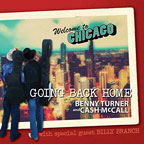 Benny
Turner & Cash McCall
Benny
Turner & Cash McCall
Going Back Home
Nola Blue Records Nola-Blu.com
Home is, of course, Chicago, for these two still-performing veterans who
recently linked up for this, Benny Turner-produced, project that pays
tribute to their shared Windy City roots and the songs they used to play
at various South and West Side clubs. They had never performed with each
other before but you can feel the chemistry, especially when they’re
joined by harmonica ace Billy Branch on a couple of tracks—a more
pensive than usual treatment of Elmore James’ “It Hurts Me
Too” (with Butch Mudbone on tasty slide guitar) and the closing
track, a great cover of G.L. Crockett’s “It’s A Man
Down There” (itself a reshaping of Elmore James’ “One
Way Out”). Along the way, the duo also shine on a Fats Waller-like
variation on the X-rated classic “The Dirty Dozens”; open
the project with a bang with a soulful gospel-stomper, “Got To Find
A Way” (that also features Turner’s daughters on backing vocals);
a modern-day talking blues sermon reflecting on “Money” and
the charmingly playful “Poison Ivy.” As Sallie Bengston of
Nola Blue notes: “Today there is much debate about what is really
blues and what isn’t. In my opinion, there is room for all of its
variations, as the genre evolves along with the world we live in. However,
it is also my opinion that not enough is done to celebrate, support and
show true appreciation for the originators; for the great generation that
laid the groundwork for so much of the music we enjoy today. There is
so much to be learned from them, preserved from them, enjoyed by them.”
Here’s a good example, before it’s too late once again.—
Gary von Tersch
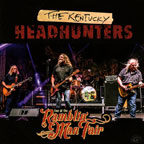 The
Kentucky Headhunters
The
Kentucky Headhunters
Live at the Ramblin’ Man Fair
Alligator Records 2019
Fasten your seatbelts and prepare to ride!
The Kentucky Headhunters have been a working ensemble under several names
and with minor personnel changes for fifty years and their energy level
is astounding for a group of septuagenarians! Original members Greg Martin,
Richard Young, Doug Phelps, and Fred Young reunited as a quartet several
decades ago, and here all four contribute vocals as Martin on lead and
Richard Y. on rhythm ply the guitars, Phelps plucks the bass, and Fred
Y. pounds percussion. This recording, in front of 25,000 zealous British
fans on the band’s first-ever tour of England, provides enough adrenaline
for the resuscitation of a corpse. An additional three tracks from their
vault, featuring late great pianist Johnnie Johnson (of Chuck Berry fame),
provides icing on the cake.
The dozen tracks include five covers, beginning with a version of “Big
Boss Man,” made most famous by Jimmy Reed. It’s three-plus
minutes of raucous raunch, with a propulsive, no-nonsense beat and the
interplay of screeching guitars. The tempo slows slightly on “Ragtop,”
but ramps up on “Stumblin’,” one of the best cuts of
the set: an irresistibly danceable shuffle evoking memories of Chuck Berry
and echoing some guitar riffs reminiscent of one of Berry’s acolytes,
Keith Richards. The same mode persists with “Shufflin’ Back
to Memphis,” which has a country rock flavor and sports some of
the best dual guitar interplay.
That guitar intertwining shines again on a long version of the blues rock
classic, “Have You Ever Loved a Woman?” Many are most familiar
with Eric Clapton’s rendition of the song, which was written by
Billy Myles and apparently first recorded by Freddie King. This version,
introduced by screaming single guitar notes backed by crunching rhythm
guitar chords, sports one of the raspiest vocals you will ever hear. Those
gritty chords reappear on “Wishin’ Well,” giving way
mid-song to a long, frantic lead guitar solo.
Have you inferred by now that this is indubitably a guitar-driven band?
The brief “Walking with the Wolf” provides some variety, with
Greg Martin playing impressive slide; the song sounds like Elmore James
filtered through the Allman Brothers Band. It’s followed by the
longest track, “My Daddy Was a Milkman,” whose lyrics inject
some wry punchy humor and whose middle section delivers some Bo Diddley
licks. The live set closes with the Headhunters’ take on the Lennon-McCartney
Beatles tune “Don’t Let Me Down,” probably the actual
last song of the live festival set, because the lead singer’s raspy
vocal finally shows wear.
Kudos for inclusion of the three bonus tracks: a slow cover of “Rock
Me Baby,” a spirited “Rock ‘n’ Roller” rave-up,
and a mid-tempo “Hi-Heel Sneakers,” all showcasing some terrific
piano from Johnnie Johnson.—Steve Daniels
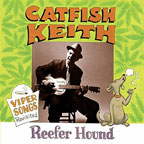 Catfish
Keith
Catfish
Keith
Reefer Hound: Viper Songs Revisited
Fish Tail CD 016
www.catfishkeith.com
Spellbindingly cutting-edge acoustic blues singer, songwriter and bottleneck
slide guitar genius, the beguiling Catfish Keith surfaces with a timely
compilation of pieces from eleven of the sixteen albums he’s released,
since his 1984 debut on Kicking Mule, that represent his favorite old
viper and party songs—most of which are garnered from the gleaming,
golden era of classic blues and jazz in the late 1920s and 1930s, with
a few from the swing era. He states, forthrightly, in his liners: “I
love these old songs and “the stuff” that goes by many names,
including muggles, gage, weed, Mezzrows, sticks of tea, shizzle, green,
da kine, even jazz Woodbines. You get the idea.” Indeed. Picks among
the 16 selections is difficult but I particularly like the way he re-invents
the likes of Jack Teagarden’s “Texas Tea Party,” his
way-cool medley of the Harlem Hamfats’ “Weed Smoker’s
Dream” and Lil Green’s “Why Don’t You Do Right,”
a “perfect piece of poetry” from Jazz Gillum titled “Reefer
Head” and Frank Stokes’ classic about prohibition-era Memphis,
“Crump Don’t Like It,” with the line “Baptist
minister sister jumps up and begins to shout, I’m so glad whisky
was voted out!” And then there’s Curtis Jones’ deep
blues observation, “Reefer Hound” (“I’m high offa
my reefer, I’m high as I can be. I’m so doggone high, the
sky seems low to me”) and the surreal tale of “Willie The
Chimney Sweeper“ as well as a couple of clever, in-the-same-vein
Catfish originals that fit like a glove—the advisory “Put
On A Buzz” and “Cool Can Of Beer,” that features some
atmospheric bottleneck on a 1930 National Duolonian. This one sits comfortably
alongside those Stash albums (Pot, Pipe, Spoon and Jug, Tea Pad Songs)
you might have gotten stoned to in the 70s, Fire up, lean back and smile
wide!—Gary von Tersch
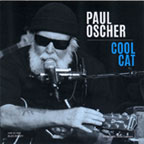 Paul
Oscher
Paul
Oscher
Cool Cat
Blues Fidelity Recordings
pauloscher.com
Paul Oscher has always been a cool cat. He was the first white player
in the Muddy Waters Band. On harp at just 17, he lived at Muddy’s
house and traveled the world with him. This cat has been living the blues
for fifty years, played and recorded with blues legends, won awards and
has inspired generations of blues players. Moving to Austin, Texas in
2012 he knew life was upping the cool when he realized he’d moved
a few doors down from his friend James Cotton who said, “Paul Oscher’s
a monster, harp, piano and guitar - plays slide like Muddy” and
Paul’s latest CD, “Cool Cat,” is about as cool as blues
gets. Playing with old friends Johnny Ace or Sarah Brown on bass, Russell
Lee, drums, Mike Schermer or Mike Keller, guitar with Tom Robinson and
Eric Burnhardt on tenor and baritone sax. As an added bit of cool Paul
displays his piano chops with a jazz quartet of Ernie Durawa, drums, Chris
Alceraz, bass and Tomas Ramirez, tenor sax.
The only cover song, “Rollin’ and Tumblin’,” takes
a different slant on the rhythm than his boss but the slide guitar and
moans are as real as it gets; Cotton was right. The rest are all Oscher,
his songs are so authentic they feel like instant classics. Hitting a
piano and bari sax rumba rhythm he yowls about his “Money Makin’
Woman” that descends into a Spann-inspired “Blues And Trouble,”
with Schermer’s skittering guitar adding to the agitation. Switching
to guitar and harp Paul swings into “Hide Out Baby,” taking
his girl to “a place she’s never been” then slides into
a sultry rhythm, his harp weeps and moans as his girl shows she knows
how to “Work That Stuff.” Miss Lavelle White sets him straight
and she’s got it all under control as a “Dirty Dealin Mama”
who always plays to win. Drummer Russell Lee recites the “Mississippi
Poem” that segues into acoustic guitar, stomping percussion and
back up chants on “Ain’t That A Man” (dedicated to Mr.
Cotton), transforming “I’m A Man” into the life of James.
Lee continues on “Poor Man Blues,” telling it like it still
is in these trying economic times with some lowdown blues. An interesting
interlude on the CD, switching to a jazz piano instrumental, his rhythmic
strides and sparking fills driving the quartet keeping them “On
The Edge,” then the title tune, “Cool Cat,” evolves
through three incarnations, a spoken word prologue of a cool real-life
story inspiring a jazzy piano and sax-led “Cool Cat,” while
a long swinging “Cool Cat” adds to the groove with guitar,
hand claps, a double rhythm section, cat calls and the squeals of children.
Paul Oscher’s “Cool Cat” confirms that he’s still
the consummate blues man but his life in Texas has let him grow and that’s
cool baby, it’s cool. —Roger & Margaret White
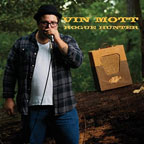 Vin
Mott
Vin
Mott
Rogue Hunter
Self released CD
www.vinmottsr&b.com
New Jersey bluesman Vin Mott’s sophomore album demonstrates, once
again, his “burning love of Chicago, Memphis, Texas and New Orleans’
traditions of the blues together with an intensive study of harmonica
performances and his songwriting skills achieved while attending the Berklee
College of Music in Boston,” as the press sheet for Rouge Hunter
somewhat awkwardly attests. Mott himself further declares in his brief
liners: “This is a blues album. It was recorded live in a makeshift
studio with minimal overdubs. Blues listeners often forget that what makes
this music great and gives it charm is its flaws and lack of heavy production.
This music is meant to be tough, haunting, joyous, and heartfelt.”
The dozen Mott originals, recorded live on the floor, not only feature
his emotionally insinuating harp work and stirring, whiskey-soaked vocals
but also showcases his tight working band with Dean Shot on guitar, Steve
“Pretty Boy” Kirsty on upright bass and drummer Matt Niedbalski.
The set opens with the groove-rich, seemingly autobiographical “Car
Troubles Make Me A Good Blues Singer” and closes with the reverb-drenched,
surf-rocking, power chord instrumental “Greaser” that recalls
Link Wray at his greasiest, with room along the way for a nifty Chicago
shuffle novelty “Give Me Cornbread,” a house-rocking, slide
guitar-driven homage to the legendary Elmore James titled “Rogue
Hunter” and the Hubert Sumlin-influenced straight-ahead shuffle
“I Got The Blues On My Mind .” Also noted is the powerfully
tragic, detail-rich, first person story song “Paterson Is Crumbling”
about life among the desolate, weed overgrown former factories and crime
riddled streets of Northern New Jersey’s 3rd Ward community. Unreservedly
recommended.—Gary von Tersch
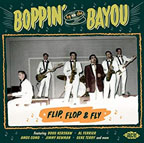 Boppin’
By The Bayou: Flip, Flop & Fly
Boppin’
By The Bayou: Flip, Flop & Fly
Various Artists
Ace CD-1529 www.acerecords.com
This is the seventh Boppin’ release in Ace’s laudatory ‘By
The Bayou’ series that once more draws the bead on white Gulf Coast
rock ‘n’ rollers, either exploring rockabilly in the wake
of Elvis or inventing what became known as swamp pop. Deriving mainly
from the studios of Louisianians J.D. Miller in Crowley and Eddie Shuler
in Lake Charles as well as those of Cosimo Matassa in New Orleans (used
by both Sam Montel and Joe Ruffino), Luke Thompson in Hammond, Floyd Soileau
in Ville Platte and Floyd Badeaux in Port Arthur, the 28 tracks on this
CD “include a host of previously unissued masters, alternate takes
and mega-rare 45s and 78s,” as liners author Ian Sadler puts it.
He continues: “Of particular note are the previously unissued distinctly
different versions of Al Ferrier’s “Blues Stop Knockin”
and Johnny Jano’s “Mabel’s Gone,” Jimmy Newman’s
very rare “H-Bomb Shuffle” and the stunning title track, a
previously unheard version of “Flip, Flop & Fly” by Gene
Terry, which demonstrates why Gene was so proud of his band, the Downbeats,
and why Eddie Shuler praised him as one of the best artists he ever had
on his roster” Other picks include Doug “Louisiana Man”
Kershaw’s lively “Kary On Boogie,” The Tune Tones’
ragged-but-right take-off on Little Richard’s classic “Tutti
Fritti,” Bob Henderson’s nifty novelty “Jail Break”
and swamp-popper T.K. Hulins’ energetic “Little Boy.”
Like Kershaw and Terry, Hulin is still active locally. To quote Mr. Sadler
once more: “Grab a glass of something strong, crank up the hi-fi,
slip on this CD and get to boppin’.”—Gary von Tersch
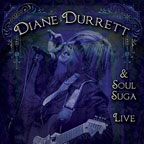 Diane
Durrett & Soul Suga
Diane
Durrett & Soul Suga
Live
Blooming Tunes Music 2018
Based in Atlanta, Georgia, singer Diane Durrett and her octet of musical
colleagues played a date at Eddie’s Attic in Decatur, “a small
artist-friendly town within the metro Atlanta area - a cultural blend
of Berkeley and Mayberry,” according to the venue’s website.
That unusual blend of sophistication and unpretentiousness apparently
suited the crowd, who sound exuberant.
We are treated on the CD to over an hour of the show…which is somewhat
misleading, since the gig seemingly was recorded in its entirety, including
multiple brief to two minute verbal digressions featuring song introductions,
banter with the audience, and storytelling about Durrett’s grandmother
and a dog. Don’t fear, though; there is plenty of music.
Durrett has a potent voice with good range, and she’s able to handle
blues, ballads, rock, soul, and country tunes, all of which are exemplified
in the set, with aplomb. In addition to the expected core of cooperating
guitarist, drummer, bassist, and keyboard player, her delivery is augmented
by Wes Funderburke on trombone, Kerren Berz on violin, and backing vocalists
Deborah Reese and Adam McKnight. The latter duo especially shines on such
tracks as “It Is What It Is”; that number allows Durrett to
let loose some of the country twang inherent in all her vocals. Another
strong track is “Love Has a Right to Be Wrong,” a mid-tempo
rocker showcasing Yoel B’nai Yehuda on organ. “Woohoo,”
at nearly eight minutes the set’s longest number, has Yehuda on
piano and a scorching guitar solo, and “Sassy Larue” introduces
a New Orleans jazzy flavor.
Toward the end of the set Durrett lets loose her sentimentality sensibility,
with varying results. Particularly questionable is her take on the Gershwin
classic “Summertime” from the musical “Porgy and Bess”;
the listener will need to decide if Diane’s rendition is moving
or simply histrionic.
Liner notes are sparse; there are no song credits, and the perpetrator
of lead guitar solos (Durrett or Markham White?) is not cited. I also
thought that I heard a saxophone; where did that come from?
Nonetheless, a good time was had by all at Eddie’s Attic, and the
listener to “Live” can enjoy along with that audience.—Steve
Daniels
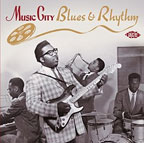 Music
City Blues & Rhythm
Music
City Blues & Rhythm
Various Artists
Ace CD CDTOP-1510
www.acerecords.com
Music City references the legendary San Francisco Bay Area’s Berkeley-based
record label, headed by the somewhat reclusive Ray Dobard, that issued
its first 78 rpm-er in 1953 with the cheeky jump blues “Your Money
Ain’t Long Enough” by enterprising West Coast bandleader Que
Martin (with the mother of funk, bassist Larry Graham, on the accusatory
vocal) on a bright yellow Delcro label. That initial venture didn’t
last long and not long afterwards the speculative Dobard began noticing
the “ever-increasing hordes of teenage consumers,” as co-compiler
Alec Palao puts it, “searching for vocal-group oriented discs.”
Dobard, with his subsequent Music City label scored from the git-go with
the local Four Deuces’ clever doo-wop drinking song “W-P-L-J”
and quite a few others in an identical vein. Along the way, however, Dobard
did record (but mostly not issue) a fair amount of blues for every type
of devotee—from the back porch and juke joint to the nightclub and
cocktail lounge. This 28 track collection, with historical liners by Lee
Hildebrand, not only proffers great efforts from the likes of Little Willie
Littlefield (who was living in San Jose at the time), Roy Hawkins (billed
as Mr. Undertaker on the flip-side of “W-P-L-J” with his eerie
death dirge “Here Lies My Love”) and Jimmy (Mr. “T-99”)
Nelson but fine numbers by a host of others. A few favorites encompass
Sidney Grande’s equally raw cover of one of 1953’s biggest
blues hits “Tin Pan Alley” (“the roughest place in town,
where they start cuttin’ and shootin’ soon as the sun goes
down”); an inspired cover of Jimmy McCracklin’s “You’re
The One” by Gene Lees & The Blues Rockers that, some say, even
features McCracklin on piano! And the downhome blues sound (complete with
harmonica) of the Richmond Boys’ reflective tale, “You Gotta
Be Mighty Careful.” Further tasty cuts abound by the likes of Chick
Morris, Gloria Jean Pitts, Pee Wee Parham, Al Smith, Jasper Evans and
others. Check this one out if you want an idea of what the Bay Area blues
scene sounded like in the jumping 1950’s. Five Stars.—Gary
von Tersch
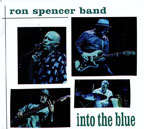 Ron
Spencer Band
Ron
Spencer Band
Into the Blue
Real Gone Records 2018
Out of central New York state, guitarist Ron Spencer has been rocking
the blues for almost three decades, since 2009 with a trio of proficient
bandmates: Bob Purdy on bass, Ross Moe on drums, and vocalist Mark Gibson.
This rollicking set of eight original tracks and two covers adds nicely
to the band’s oeuvre.
The opening rocker, “Closer to the Bone,” is a zesty number
enriched by the spirited piano of guest Dan Eaton, whose contributions
continue with “(I’m Doin’) Ah-ight,” the longest
track of the album, a mid-tempo shuffle allowing Spencer to display his
unpretentious but skilled guitar chops on a long mid-tune solo. The clear
mix provides ample opportunity to appreciate Purdy’s pithy bass
renderings on “Addicted to You,” and then the band hits maximum
synergy on the cover of a Moon Martin tune, “Cadillac Walk”;
it had my feet tapping and fingers snapping.
The ensuing cover, “Blind, Crippled & Crazy,” visits R&B
territory, with Mark Gibson delivering one of his best vocals, aided by
the backing trio of Sharon Allen, Donna Colton, and Jeff Moleski, Eaton
switching from piano to organ and Spencer lending a lyrical solo. On the
next cut, “So Wrong,” organ is handled by guest Mike Davis;
it’s another shuffle with lilting swing and with amusing lyrics.
“It’s Time” sports very adept interplay between Eaton’s
organ stylings and Spencer’s single note lead. Mark Gibson flaunts
his R&B vocal credentials again on “Callin’ to Me,”
and I think that I hear some saxophone, as well, courtesy of Eaton.
The band is far from spent, as evidenced by “Fine, Fine Woman,”
a take-no-prisoners rocker wherein Eaton really lets loose on the 88s.
The set ends in great form with “Cold Outside,” the lament
of a spurned lover relegated to a sub-freezing exile.
“Into the Blue” is a set of quality songs by a tight band,
without discernible weakness, that excels at rockers and shuffles and
that deserves widespread exposure and praise.—Steve Daniels
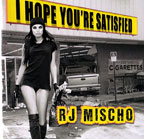 RJ
Mischo
RJ
Mischo
I Hope You’re Satisfied
Bluebeat Music 2018
For his first new release in three years, harmonica maven Mischo dug into
his vault to present fourteen studio outtakes from past recording sessions,
ranging from 2008 to 2014. The only (warranted!) conclusion to be drawn:
those tracks which survived the sessions must have been pretty damn good
(they were), because these “rejects” comprise a set well worth
enjoying…repeatedly.
Minnesota native Mischo, now based in Ventura, CA, has a resume of over
a dozen albums of his own, and myriad appearances on releases of others,
including James Cotton, John Mayall, Jimmie Vaughan, Candye Kane, Sonny
Rhodes, and Mark Hummel. Among his collaborators here are a slew of top-notch
rhythm players and a roster of excellent guitarists, among them Kid Andersen,
Johnny Moeller, Rusty Zinn, Jon Lawton, and Bob Welsh. In addition, a
dozen of the tracks are Mischo’s own compositions.
The listener will be treated to a variety of tempos, and RJ’s vocals
are consistently appealing. Not surprisingly, his harp playing is the
focus. It is readily appreciated on “Country Shakedown,” a
spare number featuring only RJ on harmonica, Welsh on acoustic guitar,
and Lawton on resonator steel. Mischo’s harmonica chops are equally
well deployed, with echo reverb, in the four minute Chicago blues instrumental
“Kalamazoo Kicker,” and in the brief solo outing “J.F.
Harmonica Boogie.” (Those lucky enough to have seen Mischo perform
live know that he always offers at least one unaccompanied harmonica number,
and it never fails to maintain interest and garner accolades.)
Another standout is “You Can’t Hurt Me Anymore,” penned
by Wisconsin harmonicat Jim Liban; it’s an all-out rocker driven
by Richard Medek on drums. The other cover, the humorous “Might
Be Your Woman,” is one of the longest tracks of the fifty minute
set and is delivered as an irresistible dance number propelled by West
Coast first-call drummer June Core and Andersen. Core, Andersen, bassist
Kedar Roy, and pianist Sid Morris also team on the slow, pithy instrumental
“Sneezers Blues.”
Those unfamiliar with RJ Mischo’s preeminence as a contemporary
harmonica player will undoubtedly want to seek out his other releases;
those who already know him won’t be surprised by this searing set.—Steve
Daniels
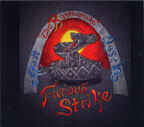 Matt
“The Rattlesnake” Lesch
Matt
“The Rattlesnake” Lesch
Furious Strike
Facebook.com/matttherattlesnakelesch
It seems the latest craze on the blues scene is the young guitar prodigy.
Every blues town has one and not to denigrate them, most are fabulous
player for any age. When I received Matt “The Rattlesnake”
Lesch’s debut CD, “Furious Strike,” I noticed he was
twenty-one, from St Louis, MO and on first listen saw he plays a few songs
that Stevie Ray had covered. But that second listen was a real wake up
call, the best songs were his originals and he was really saying something.
The band is Matt Lesch on guitar and vocals, another young player, Luke
Sailor, keyboards and what could be a family rhythm section of Tecora
Morgan, bass and Riley Morgan, drums; no one is taking this as just a
job - they’re really working it. This Snake is getting cred from
older players who worked with SRV and Albert King but his ferocity comes
from Matt’s own self confidence.
Starting his “Strike” with an easy rolling instrumental, “Shake
N Crawl,” that is truly original while in his covers of “Crosscut
Saw” and “I’m Going Down” you can hear the fire
building, though his voice does betray his age, as “Voodoo Child
(Slight Return)” includes some riffs from Jimi’s “Power
Of Soul” as well. The remaining originals are where Matt really
takes off and hits it hard, his tone and intensity taking a major jump.
Matt singing about his first guitar, the decade he’s been “Rattlin’”
on it, unleashing a wah wah and just getting started. The “Rattlesnake
Shuffle” has a Leslie sound while Luke’s electric piano takes
part as a second lead. Matt’s heartfelt pleading vocals come though
on “Still Got My Blues,” a tale of lost love with expansive
organ fills that the guitar sweeps aside with a confident stroke that
builds like “Loan Me A Dime.” Going for a jazzier take on
the instrumental “Unpredictable,” the drummer gets a chance
to show his chops against fluid guitar while it showcases the keyboards
of Sailor and “In The Rain” has a more rock feel. Then cranking
up like a rumbling Harley, his voice roughening to a growl, “Ride
This Train” starts with a slow churning drive picking up speed on
each lead. An eye opener is “We’re Not Gonna Give Up”
with haunting harmonies its deep tough lyrics about struggles in these
economic times shows off Matt’s voice and his screaming guitar thrusts
over the edge into a free fall as it fades out, then they offer an alternative
version featuring more keyboards and its interplay with guitar proving
this band isn’t “Gonna Give Up.” The real topper is
Matt’s cover of B.B. King’s “Three O’Clock Blues”
; just close your eyes, it’s his utter confidence on both his instruments
that sell this song.
With the debut CD of Matt “The Rattlesnake” Lesch on “Furious
Strike” he joins a small family of real players. —Roger &
Margaret White
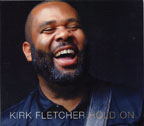 Kirk
Fletcher
Kirk
Fletcher
Hold On
Elaysia Music kirkfletcherband.com
For more than twenty years Kirk Fletcher has been a standout guitarist
in west coast blues, from the Mannish Boys to Kim Wilson, his playing
has galvanized each session he’s sat in on. He recorded his first
solo album, “I’m Here & I’m Gone” for the
English JSP label in 1999 and while “Hold On” is the fifth
record Kirk has released under his own name the liner notes say, “I
feel this is my first real solo record.” Returning to the UK to
record this latest CD, Fletcher plays with a very small band of Jonny
Henderson on keyboards, who’s known for his work with British guitarist
Matt Schofield, and Florida-based drummer Matt Brown backing Kirk’s
guitar and vocals. Writing all the songs, producing the record himself
and releasing it on his own label, he’s taken the concept of keeping
it simple to make this wholly his own.
A swirl of organ and drums open “Two Steps Forward” as Kirk’s
sharp guitar punches in, his baritone drawl takes “ten steps back”
till the powerful vocal of Mahalia Barnes blasts in, upping the funk as
Kirk’s lead guitar maneuvers forward. Kirk’s vocal comes on
strong, swooning above the double-tracked lead guitars digging into the
groove of “You Need Me.” An upbeat floor filler that belies
the title, “Sad Sad Day,” the jangling piano and chugging
rhythm guitar driving onward as Kirk declares the harder he tries the
more you run away. “The Answer” has a gentle pleading vocal
searching to “turn his life around” as his nimble fingers
search for that note as it builds throughout the second half of the song
climbing higher and digs into each phrase before returning to his opening
melody. As plodding drums sets the “Times Ticking” against
the sweeping slash of guitar that climb to a Hendrix-like cry, then taking
a jazzier swing to this organ trio instrumental “Dupree,”
a tribute to one of Kirk’s heroes, guitarist Cornell Dupree, finishing
with a funked-out fuzz bass and electric piano groove. Kirk’s bluesy
leads set the stage as he calmly sings he’s “Gotta Right”
to sing the blues; “seems like he was born to lose” but his
forceful guitar bursts back in, determined to get over any loss. A calmness
pervades “Hold On,” the gospel-tinged backing vocals of Jade
McCrea sweeten Kerk’s tranquil voice and his plea to love one another.
Kirk Fletcher has been a sideman supreme for decades and with “Hold
On” he’s stepping out on his own.—Roger & Margaret
White
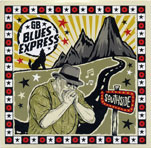 GB
Blues Express
GB
Blues Express
Southside
Blues Express Records
Blues has truly become a universal language, springing from the Deep South
it ventured north to the Big City, crossed over the seas spreading to
Europe, Japan and South America. In 2015 the GB Blues Express from Norway
made the journey to ground zero to record “Live at the Shack Up
Inn Mississippi,” now after four years they’ve released a
new CD recorded in their native land simply titled “Southside.”
The band’s name and their sound are fully Americanized, the only
thing that may give you a hint to their origin is the names of the band
members. The GB in their name is for Geir “Milkman” Bertheussen,
harmonica and vocals, with their main songwriter Kai “Sugar Kay”
Fjeliberg on guitar and vocals, Trond “Boogieman” Hansen on
bass and Kare “Lefty” Amundsen on drums. They have some additional
help from Morten Larsen, piano, Rune Karisen or Jan Tore Lauritsen, organ,
Dave Fields guitar and backing vocals with the Red Hot Horns featuring
Magnus Malmedal Dragen, trumpet, Pal Gunnar Fiksdal, trumpet, Runar Flksdal,
trombone and Lars Petter Bjerkeset, sax. All the songs are originals but
sound as if they could have come straight from the Southside.
Getting right down to business with an instrumental from Sugar’s
guitar dusting “Cakewalk” with sweet Southside licks that
lead into GB’s “Born On The Southside” the vocals strutting
with pride that he’s hooked on the blues. Stepping up the intensity
GB declares he’s the “King Of My Castle,” his harp on
equal status with the deep guttural vocals then horns roll in over swelling
organ riffs for the “Steppin’ Stone” that’s dominated
by strong guitar. Easing to a stroll on “How We Roll,” the
gentle vocal calmly croons as Sugar’s sweet guitar punctuates each
line. An Elmore-like slide against a “Mojo Working” rhythm
hit “Hard Times” as a warbling harp adds fills after each
verse and the slide takes off again. A stinging shuffle that has the harp
sashaying around the beat and between the lyric of “Supergirl”
then a steady rolling wave of rhythm and the rumbling growl of vocal as
the “World Is Shakin” and sheets of guitar come tumbling down.
Sugar’s guitar has a shimmering Peter Green-like quality on “Lone
Wolf,” the strong yet subdued vocals are “keeping to himself”
as the harp howls and growls.
Though the GB Blues Express are from Norway their newest release, “Southside,”
is on a fast track aimed right at the blues. —Roger & Margaret
White
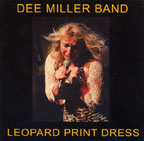 Dee
Miller Band
Dee
Miller Band
Leopard Print Dress
DeeMillerBand.com
Ms Dee Miller has been a long time Midwestern Diva running her own band
for fifteen years earning the title “The Duchess of the Blues”
in her hometown of St Paul, Minnesota and will be representing Minnesota
at the 2019 International Blues Challenge in Memphis. Dee Miller’s
band features Craig Clark on guitar, lead and backing vocals, Eric Meyer
bass, vocals, Jesse Mueller keyboards and Mike DuBois drums. For a petite
woman Dee has a powerful, full-bodied voice and her latest release “Leopard
Print Dress” is a real knockout.
The band kicks off the party with an original, getting the house rocking,
you can almost hear the glasses clink as the piano swings and Dee growls,
lets get “Hot And Sweaty.” Craig Clark starts off the lead
vocal intro on “Leopard Print Dress” written by Miller and
former bandmate Jimi ‘Primetime’ Smith then lets Dee work
her skirt as Paul Mayasich lets fly a slide solo. Funky keys and wah wah
guitar churn through Bekka Bramlett’s “Strongest Weakness”
as Dee comes on full force overpowering this funky bunch. Then Mueller
gets a chance to strut his boogie woogie piano chops as Dee jumps on Kelly
Jean Hunt’s “Back In The Saddle,” taking charge with
a full horn section to boot. Then easing back, the dueling keys of John
Pinekaers’ piano and Toby Marshall’s organ, it’s Dee’s
deep intense vocals that “Take It To The Limit,” building
a gospel intensity so soulful it took a while to realize this was an Eagles
song. The dueling keys continue as Dee gets lowdown, pulling the pathos
from Johnny Taylor’s “Last Two Dollars” as Clark’s
subtle background vocals and powerful guitar solos are a big payoff. Ms
Miller truly makes “I Sing The Blues” her own as Steve ‘Boom
Boom’ Vonderherr weaves a lonesome harp around her vocals and Clark’s
guitar gives a rolling rhythm and stabs of punctuation. Drifting to a
gentle sway, Dee croons over Marshall’s light organ and Boom Boom’s
harp as the cymbals dance around the rhythm and soulful backing vocals
chime in like a horn section with Dylan Salfer playing some wonderful
slide guitar on Derek Trucks’ “Midnight In Harlem.”
Craig Clark steps to the front on vocals for Albert Collins “Black
Cat Bone” as John Pinekaers sprinkles some juju on piano and Clark
lays down some heavy mojo on his solo, driving his vocals to the edge.
Then Craig throws down a heavy riff as Miller moans and cries that her
man has been “Steppin’” out as the piano plunks out
a protest and the guitar gives a thunderous reply till Dee steps in to
set things straight.
The Dee Miller Band’s latest CD, “Leopard Print Dress,”
ain’t just a frilly frock, these blues are the real thing. —Roger
& Margaret White
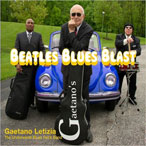 Gaetano
Letizia & The Underworld Blues Rock Band
Gaetano
Letizia & The Underworld Blues Rock Band
Beatles Blues Blast
Self-released
www.gaetano@gaetanoletizia.com
Born in Cleveland in 1951 and inspired by the likes of B.B. King, Muddy
Waters and Albert King, Letizia was performing as a teenager—an
early stage appearance had him sitting in for the James Gang’s Joe
Walsh—and he’s been at it ever since. As Letizia explains
in his brief liners: “Yo Beatles fans, in case you didn’t
know it, the fab four were originally a blues band as were so many of
the famous British invasion bands. Well, we decided to take them back
where they came from and make their magical music bluesy again.”
With his partners in crime, drummer Mike D’Elia and bassist Lenny
Gray, Letizia proffers a rowdy romp through through 17 classic tunes from
the Beatles catalog, quite cleverly arranged and re-framed as a lo-fi
funky, rocking blues jam session. Favorite numbers include an in-the groove
version of Abbey Road’s “Come Together,” the novelty
song with a great riff “Birthday,” a swamp blues-accented
“Do It In The Road” along with “Yesterday”—re-imagined
as a cushiony blues rhumba. A Latin-suffused “And I Love Her”
reflects a 1970s Santana sound while “Can’t Buy Me Love”
recalls the exuberantly gritty Chicago blues and not to overlook their
recall of “She Came In Through The Bathroom Window” that recalls
Joe Cocker’s impassioned version. Also noted are crafty revisions
of a couple of George Harrison gems—“Taxman” benefits
from a Texas shuffle treatment while “My Guitar Gently Weeps”
glidingly shifts between a samba and a power ballad. That rare concept
project that works Two thumbs up!—Gary von Tersch
Book
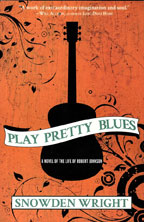 Play
Pretty Blues:
Play
Pretty Blues:
A Novel of the Life of Robert Johnson
by Snowden Wright
212 pages, paperback
Engine Books, 2013
Since the widespread release of his limited catalogue by Columbia Records
in the early 1960s, Robert Johnson has carried the title of King of the
Delta Blues. (There are those who disagree; many claim that the mantle
should rest on the shoulders of Johnson’s predecessor Charley Patton.)
Ironically, less is known about Johnson’s personal and creative
life than is documented about most of his contemporaries. Who was Robert
Johnson? What was his life really like? Where did he get his inspiration?
His prowess on guitar? Are there really only two surviving photos of him,
and are they authentic? Where did the legend arise that he made an infamous
pact with Satan himself to master the blues? When and where did Johnson
die, and how?
The relentless and exhaustive searching of musicologists and historians
has failed to provide definitive answers, and it is unlikely that they
will ever emerge. We know that he was born in 1911; we know that he died
in 1938; we know that the sparse twenty-nine songs that he recorded will
maintain his exalted legacy. We know little more.
While acknowledging the invaluable non-fiction contributions of several
writer researchers - books by Peter Guralnick, Barry Lee Pearson and Bill
McCulloch, and Elijah Wald are cited - Snowden Wright has chosen a different
path. Play Pretty Blues is a fictional re-working of Johnson’s life,
situating it in the impoverished, oppressed, and yet vibrant milieu from
which he arose. Amusingly and often poignantly, the story is told in the
individual - and sometimes collective - voice of his six abandoned common
law “wives,” all of whom allegedly loved him and cherish his
legacy decades after his disappearance and likely demise.
Thus we learn about Robert’s brief and ill-fated one legal marriage,
his tutelage under the guidance of guitar wizard and con man Ike Zinnerman
and his roving exploits with his younger musical soulmate Robert Shines.
(Shines [of course], Zinnerman, and such record industry figures as Ernie
Oertle and H.C. Speir are real historical figures, but their intersections
with Johnson are imagined.) We see Robert’s beguiling combination
of humility and lack of self-control. We are privy to travels in railroad
boxcars, drunken sprees, instances of both grace and greed. We observe
him performing blindfolded before wealthy white partygoers, and then being
assaulted by the man who recruited him for the party: “risen knuckles
cracked hard against Robert’s temple with shocking clout…before
he went unconscious. Robert came back to his senses in a victory garden
that had been overrun since the war. Artificial stars bloomed above his
dizzy head. The first thing he did was check for the $200 in the pocket
of his coat. The next thing he did was look for his guitar.”
Wright has obviously done impressive research. He intersperses the few
uncontested facts of Johnson’s life with a delineation of the sights,
sounds, products, and practices of life in the Mississippi delta during
the 1920s and 1930s, and his prose, while occasionally challenging in
its use of vernacular language and abstruse allusions, often reaches the
realm of the poetic. “Above their heads in the dark of cypress canopy,
a spider hanging on its line drifted in rhythm to the gummy breeze, a
pendulum with the world for a clock. The spider clamored back up to its
web in the tree, stopping time in mid-tick of a hot summer afternoon….Along
the current of the river, invisible water bugs skimmed its calm surface,
their wake the only way to know they were there.”
Even though we will never know in detail the particulars of Robert Johnson’s
life, we now have a plausible account of what it could have been like…and
a worthy novel to boot.—Steve Daniels
Home
/ Blues Blogs /
Artist Links / Blues
Links / Videos / Store
Subscribe / Advertise
/ Back Issues
/ Contact / Staff